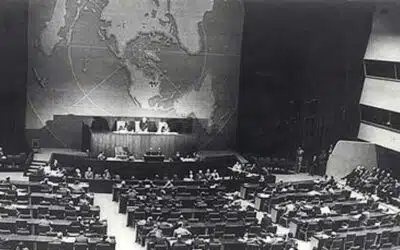The New York Times reports on how the truce that began on Friday has already fallen apart, with both sides blaming each other for breaking it. But what I want to draw attention to is not what the Times reports, but how it reports it. The article, titled “In Syria, Cease-Fire for Holiday Falls Apart”, notes that:
Extremist brigades outside the Free Syrian Army, the main rebel umbrella group, had said from the beginning that they would not respect the truce.
But then quickly moves on with a dominant narrative of how the Syrian government violated the truce:
In perhaps the most serious outbreak, a warplane fired missiles into a residential building in the Damascus suburb of Arbeen, killing eight men, according to the Syrian Observatory for Human Rights, which tracks the fighting from abroad.
If confirmed, it would be the first aerial attack since the ad hoc truce started on Friday morning. The account could not be independently confirmed, but pictures posted on Facebook showed a shattered residential structure and a large crater filled with rubble where a missile seems to have exploded.
In Aleppo, an activist who uses the nickname Abu al-Hassan said government tanks had resumed shelling, especially around the airport. Several towns around Aleppo and in an adjacent province, Idlib, were also shelled, activists said.
“There is a clear breach of the truce,” Ahmad Kadour, an Idlib activist, said.
Government forces were moving convoys full of reinforcements up the road to Wadi al-Deif, the site of a military base where there was fighting a day earlier, he said.
Rebel commanders had been worried from the outset of the truce that the Syrian military would use it to try to resupply beleaguered northern outposts in order to retake ground it had lost to the rebel fighters in recent weeks.
To review, the story the Times tells, relying entirely on opposition sources, is how the government violated the truce with an airstrike in Damascus, resumption of shelling in Aleppo, and sending in reinforcements to retake lost ground.
How accurate is the Times’ characterization? Let’s take Damascus. It’s interesting to compare what other media had to say about the initial event that effectively ended the truce. Here are some other headlines:
“Car bombing in Damascus explodes holiday cease-fire” – Los Angeles Times (Blog)
“Damascus car bombing wrecks Syria Eid al-Adha truce” – BBC
“Syria: truce unravels on first day with Damascus car bomb” – The Telegraph
“Deadly Damascus car bomb shatters Eid ceasefire in Syria” – Associated Press
“Syrian car bomb hits dozens as holiday truce crumbles” – Agence France-Presse
“At Least 5 Killed, Over 30 Injured in Damascus Bomb Blast” – Voice of America
“No Eid ceasefire for Syria: Car bomb rocks Damascus, fighting rages at checkpoints” – RT
“Car bombing shatters Syria ceasfire” – ABC (Australia)
Okay, you get the picture. Notice any difference in how the breakdown of the truce was reported elsewhere? How is it possible that the New York Times did not even mention this car bombing? Zero. Zip. Nada.
So what do we know about that car bombing? Well, it occurred near mosque and a temporary playground erected for the Muslim festival of Eid al-Adha in Daf al-Shouk, a Sunni residential area in southern Damascus. Five people were reportedly killed and more than 30 injured, including children. As the BBC noted, “The car bomb in Damascus appears to have wrecked any lingering chance that the truce might take hold.” The Telegraph observed, that while “opposition fighters blamed the government”, in fact, “many similar bombings have been carried out by Islamists”. The Associated Press reported that it “was not immediately clear” what the target was,
A Damascus resident, who spoke on condition of anonymity fearing reprisals, said it may have been a residential complex for police forces located in the southern Daff el-Shouq district. The Islamic extremist group Jabhat al-Nusra, which is fighting alongside the rebels and has rejected the cease-fire, has claimed responsibility for several past bombings targeting the regime.
While the al-Nusra group denied responsibility, the bombing does indeed fit the pattern of terrorist attacks perpetrated by rebel forces, such as a car bombing outside a police station in a predominantly Christian neighborhood in the Old City of Damascus less than a week before the truce went into effect. The Telegraph reported on that incident:
Up to 10 people were killed and 15 wounded as the charge detonated at the historical gate of Bab Touma, a busy pick up point for taxis and buses.
“The bomb exploded as people were moving to go to Churches for Sunday mass. It exploded just outside the police station. There was a bus stop right beside it,” said a resident calling himself George who works in a hotel just a few streets away from the explosion. “I felt the explosion. The ground beneath me shook and I can see black smoke rising from the area.
“Terrorists are doing this,” said George, a Christian who, like many residents in Bab Touma lives in fear of the rebel fighters trying to gain control of the capital.
And immediately after the car bombing on Friday that shattered the truce, there was another car bombing on a military checkpoint in Daraa that reportedly killed 11 soldiers (BBC, VOA, RT, ABC). And the same Times article, while mysteriously neglecting to mention the car bombing that shattered the truce in Damascus, points out that there was yet another car bombing in Deir al-Zour, where “fierce firefights erupted between government forces and rebel fighters after a car bomb exploded near a military headquarters and in front of the Syriac Orthodox Church”.
There was another car bombing that killed ten and wounded 41 on Monday in Jaramana.
Now, let’s look at the situation in Aleppo. As the AP reported on Thursday, rebel forces had “claimed major gains” there, pushing into “predominantly Christian and Kurdish neighborhoods”. And then there’s this minor little detail that the Times didn’t mention:
Jabhat al-Nusra, a radical Islamic group that has been fighting alongside the rebels and has taken a lead in the battle for Aleppo, said it won’t comply with the truce.
Okay, so much for the narrative that the Syrian government was responsible for breaking the truce in Aleppo.
How about the rest of the Times’ narrative? Well, we can learn elsewhere that the truce “also broke down around a besieged government base near the strategic town of Maarat Al Numan”, which “has been surrounded by rebel fighters for days” (VOA). CNN fills in a few more details:
Fierce fighting broke out between government forces and the al Qaeda-linked al Nusra Front, which had said earlier it would not abide by the terms of the temporary truce. The al Nusra fighters laid siege to a military encampment east of the city of Maaret al-Numan.
Rebel forces had similarly laid siege to the Wadi al-Deif military base mentioned by the Times (RT).
Where does all that leave the Times dominant narrative that it was Syrian government forces that were mainly responsible for violating the truce?
One last detail. Turns out the Free Syrian Army agreed to the truce only if the government release detained rebels from custody, a condition the government appears to have complied with (RT, CNN).
Shifting gears, another Times article reports:
Militant Sunnis from Iraq have been going to Syria to fight against President Bashar al-Assad for months. Now Iraqi Shiites are joining the battle in increasing numbers, but on the government’s side, transplanting Iraq’s explosive sectarian conflict to a civil war that is increasingly fueled by religious rivalry.
Some Iraqi Shiites are traveling to Tehran first, where the Iranian government, Syria’s chief regional ally, is flying them to Damascus, Syria’s capital….
…Iran, which, like Iraq, is majority-Shiite, appears to be playing a critical role in mobilizing Iraqis.
According to interviews with Shiite leaders here, the Iraqi volunteers are receiving weapons and supplies from the Syrian and Iranian governments, and Iran has organized travel for Iraqis willing to fight in Syria on the government’s side.
Iran has also pressed the Iraqis to organize committees to recruit young fighters.
Gosh, those evil Iranians, meddling in other nations’ foreign affairs! Don’t they know only the U.S. is allowed to do that? The U.S., of course, has been coordinating support for the armed rebels seeking to overthrow the Assad regime, whose ranks include al-Qaeda, with most of the arms supplied ending up in the hands of jihadists. A bit further on, the Times adds:
This sectarian cast has been heightened by the influx of Sunni extremists aligned with Al Qaeda, who have joined the fight against the Syrian government much as they did in the last decade against the Shiite-led Iraqi government.
So U.S. has been helping to arm terrorists, while Iran is reportedly mobilizing forces to combat the al-Qaeda allied rebels. Would it be fair to say that Iran is fighting a War on Terrorism™?


